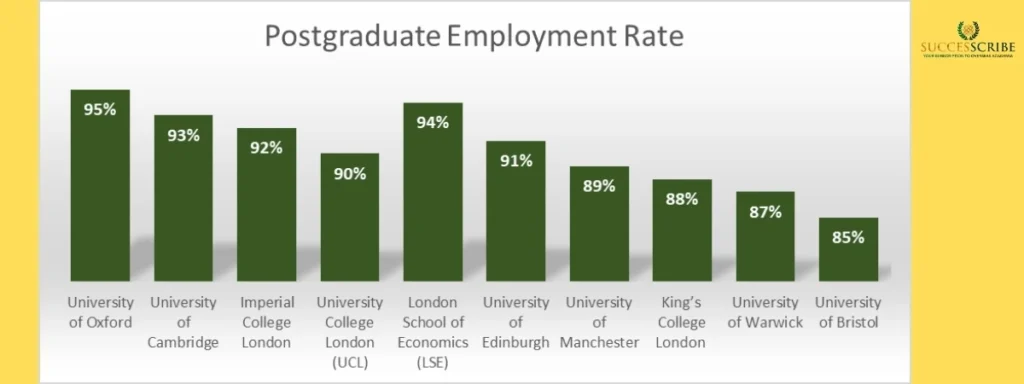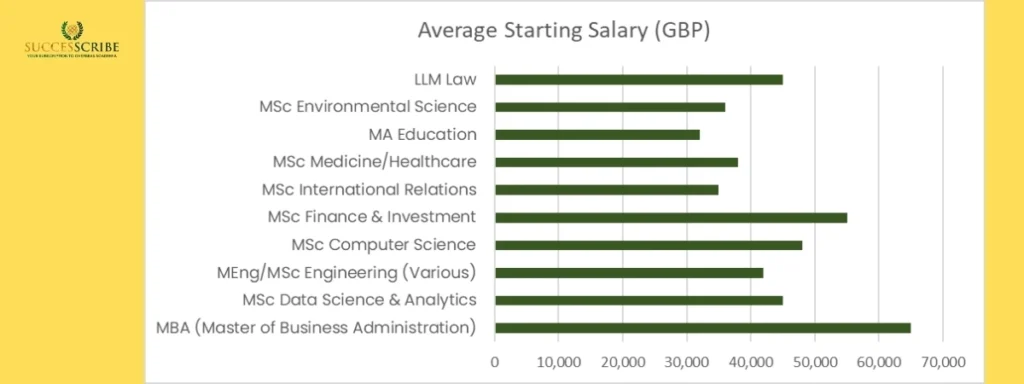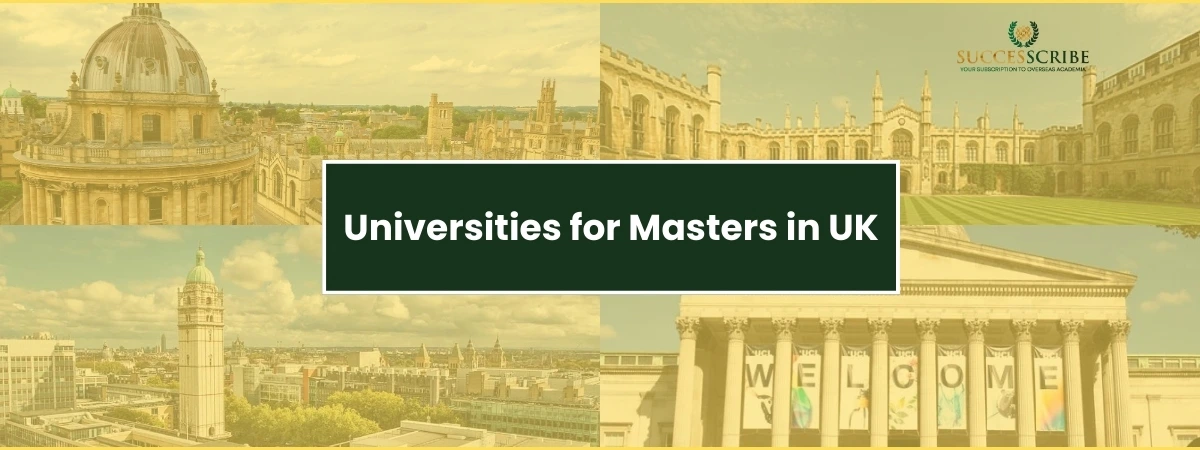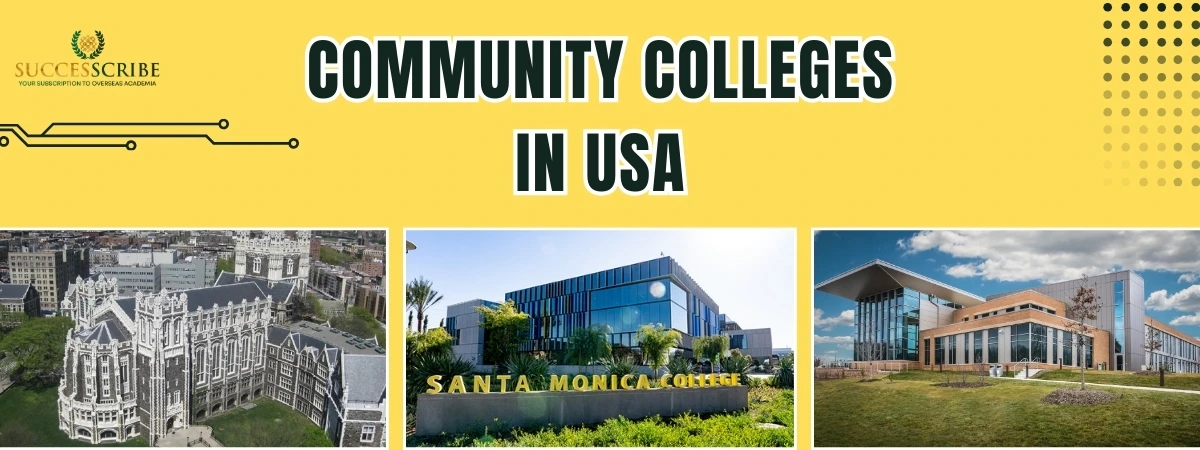Pursuing a master’s degree in the United Kingdom has long been a prestigious choice for students worldwide. In 2023/24, international students comprised 23% of the total student population in UK higher education, with nearly 732,000 overseas students enrolled.
This topic provides an in-depth overview of the UK’s universities for master’s programs, offering insights into their rankings, program offerings, international student experiences, financial considerations, and more. With over 150 globally recognized institutions, Universities for Masters in UK stand out for offering world-class education, one-year programs, and some of the highest graduate employability rates in the world
Key Highlights – Universities for Masters in UK
| Aspect | Key Points |
| Global Reputation | 4 UK universities in QS Top 10 (Oxford, Cambridge, Imperial, UCL); 17+ in world’s Top 100. |
| International Students | 732,000 in 2023/24, with 40% enrolled at postgraduate level. |
| Tuition & Costs | Tuition: £12,000–£45,000/year (MBA & Medicine up to £60,000). Living: £850–£1,800/month. |
| Public vs Private | Public unis (Oxford, Cambridge, UCL) – global rankings, more scholarships. Private unis (Buckingham, Regent’s) – lower fees, niche focus. |
| Scholarships | Clarendon (Oxford), Gates Cambridge, UCL Global Masters, Warwick Chancellor’s, LSE GSS. |
| Popular Programs | MBA, Data Science, Computer Science, Engineering, Finance, Medicine, Law. |
| Employability | 86% employment within 6 months; avg salary £35,000–£50,000. |
| Post-Study Work | Graduate Route Visa: 2 years (Master’s), 3 years (PhD); option to Skilled Worker Visa. |
| Top Cities | London, Oxford, Cambridge, Edinburgh, Manchester, Birmingham, Glasgow, Leeds. |
Reputation of Master’s Universities in the UK
UK universities have built a centuries-long reputation for academic excellence, research, and global employability. A master’s degree from the UK is not just a qualification but also a brand of prestige recognized worldwide.
Why UK Universities Are Highly Reputed
- Global Rankings
- The UK consistently dominates QS World University Rankings 2025 with 4 universities in the top 10 (Oxford, Cambridge, Imperial, UCL).
- Over 17 UK universities rank in the world’s top 100, making it one of the strongest higher education systems globally.
- Research Excellence
- UK universities produce 14% of the world’s most highly cited research despite representing less than 1% of the global population.
- Universities like Oxford, Cambridge, Imperial, and Edinburgh are leaders in innovation and interdisciplinary studies.
- Graduate Employability
- The UK ranks among the top 3 destinations for employability (QS Graduate Employability Rankings 2025).
- On average, master’s graduates earn £35,000–£50,000 per year within 6 months of graduation.
- Diverse International Community
- In 2024, there were over 680,000 international students in the UK, with more than 40% enrolled at postgraduate level.
- This diversity strengthens the reputation of UK universities as global education leaders.
Top Universities for Masters in the UK

More than 150 Universities for Masters in UK welcome international students each year, with leading names like Oxford, Cambridge, Imperial, and UCL offering programs that ensure employment rates of 90%+
| University | Average Tuition Fees (GBP) | International Student Percentage | Postgraduate Employment Rate |
| University of Oxford | £30,000–£40,000 | 45% | 95% |
| University of Cambridge | £28,000–£38,000 | 40% | 93% |
| Imperial College London | £32,000–£42,000 | 50% | 92% |
| University College London (UCL) | £29,000–£39,000 | 48% | 90% |
| London School of Economics (LSE) | £35,000–£45,000 | 55% | 94% |
| University of Edinburgh | £27,000–£37,000 | 43% | 91% |
| University of Manchester | £26,000–£36,000 | 46% | 89% |
| King’s College London | £30,000–£40,000 | 44% | 88% |
| University of Warwick | £28,000–£38,000 | 42% | 87% |
| University of Bristol | £27,500–£37,500 | 41% | 85% |
Program-Wise Top Universities for Masters in UK

Students can choose from over 2,000 specialized programs across top-ranked Universities for Masters in UK, ranging from Computer Science and Engineering to Business, Medicine, and Law. The UK offers world-class master’s programs across a variety of disciplines.
| Program | Top Universities |
| Computer Science & AI | University of OxfordImperial College LondonUniversity College London (UCL)University of EdinburghUniversity of CambridgeUniversity of ManchesterUniversity of Warwick |
| Program | Top Universities |
| Business & Management | London Business SchoolUniversity of Cambridge (Judge Business School)University of Oxford (Saïd Business School)London School of Economics and Political Science (LSE)University of Warwick (Warwick Business School)University of Edinburgh |
| Program | Top Universities |
| Engineering & Technology | University of Oxford University of Cambridge Imperial College London University of Edinburgh University College London (UCL) University of Manchester King’s College London |
| Program | Top Universities |
| Data Science and Analytics | University of OxfordImperial College LondonUniversity College London (UCL)University of EdinburghUniversity of WarwickUniversity of ManchesterUniversity of Glasgow |
| Program | Top Universities |
| Arts, Humanities & Social Sciences | University of OxfordUniversity of CambridgeUniversity College London (UCL)University of EdinburghKing’s College LondonLondon School of Economics and Political Science (LSE)University of St Andrews |
| Program | Top Universities |
| Finance & Economics | London School of Economics and Political Science (LSE)University of OxfordUniversity of CambridgeUniversity College London (UCL)University of WarwickUniversity of Edinburgh |
| Program | Top Universities |
| Medicine & Life Sciences | University of OxfordUniversity of CambridgeImperial College LondonUniversity College London (UCL)University of EdinburghKing’s College LondonUniversity of Manchester |
Most Popular Masters Programs in UK Universities

The UK offers an extensive range of Masters programs across all disciplines. Business and Management programs lead in popularity, followed by Engineering, Computer Science, and Medicine. The diversity of programs allows students to find specialized courses that align perfectly with their career aspirations and interests.
Recent trends show significant growth in demand for programs in Data Science, Artificial Intelligence, Sustainability Studies, and Digital Marketing. These emerging fields reflect the evolving job market and the UK’s commitment to staying at the forefront of technological and social innovation.
Top 10 Most Sought-After Masters Programs
With applications exceeding 45,000 per year for MBAs alone, the demand for programs at leading Universities for Masters in UK highlights their global appeal and strong graduate outcomes.
| Program Category | Average Applications per Year | Employment Rate Post-Graduation | Average Starting Salary (GBP) |
| MBA (Master of Business Administration) | 45,000+ | 96% | £65,000 |
| MSc Data Science & Analytics | 35,000+ | 94% | £45,000 |
| MEng/MSc Engineering (Various) | 40,000+ | 95% | £42,000 |
| MSc Computer Science | 32,000+ | 93% | £48,000 |
| MSc Finance & Investment | 28,000+ | 91% | £55,000 |
| MSc International Relations | 25,000+ | 87% | £35,000 |
| MSc Medicine/Healthcare | 30,000+ | 98% | £38,000 |
| MA Education | 22,000+ | 89% | £32,000 |
| MSc Environmental Science | 18,000+ | 85% | £36,000 |
| LLM Law | 20,000+ | 88% | £45,000 |
Tuition Fees for Master’s Programs in UK Universities
Tuition fees for international students pursuing master’s degrees in the UK vary significantly based on the university, program, and location. While some programs are more affordable, others, especially in fields like Business, Engineering, and Medicine, can be quite expensive.
| University Tier | Annual Tuition Fees (International) | Living Costs (London) | Living Costs (Outside London) | Total Annual Cost |
| Russell Group Top 10 | £25,000 – £45,000 | £15,600 – £16,800 | £10,800 – £15,600 | £40,600 – £61,800 |
| Russell Group Others | £18,000 – £30,000 | £15,600 – £16,800 | £10,800 – £15,600 | £33,600 – £46,800 |
| Other Universities | £12,000 – £22,000 | £15,600 – £16,800 | £10,800 – £15,600 | £27,600 – £38,800 |
| Specialized Programs (MBA, Medicine) | £30,000 – £60,000 | £15,600 – £16,800 | £10,800 – £15,600 | £45,600 – £76,800 |
Universities for Masters in UK: Scholarships
UK universities recognize that financial support plays a pivotal role in attracting top global talent for master’s studies. In 2025, nearly all leading universities offer a suite of scholarships tailored explicitly for master’s applicants, combining merit-based awards, financial need assistance, and subject-specific bursaries. These scholarships reduce the cost burden, making elite UK education more accessible to outstanding students worldwide.
Top Universities in the UK with Master’s Scholarships
| University | Flagship Scholarships for Master’s Students | Coverage |
| University College London (UCL) | UCL Global Masters Scholarship | £15,000 per year towards tuition for international students from low-income backgrounds |
| University of Oxford | Clarendon Fund Scholarships | Fully funded: tuition + living costs for outstanding graduates |
| University of Cambridge | Gates Cambridge Scholarships | Full cost of study, travel, and maintenance; merit-based for global students |
| Imperial College London | Imperial President’s Scholarships | Full tuition + stipend for exceptional students in STEM fields |
| University of Warwick | Warwick Chancellor’s International Scholarships | Covers full tuition + maintenance stipend for research and taught master’s |
| University of Edinburgh | Edinburgh Global Masters Scholarships | Partial tuition fee waivers for international students |
| London School of Economics (LSE) | Graduate Support Scheme (GSS) & LSE Master’s Awards | £5,000–£15,000 depending on need and merit |
Post-Study Work Opportunities after a Master’s in the UK
One of the biggest advantages of pursuing a Master’s in the UK is the opportunity to stay back and work after graduation. The UK government actively encourages international talent through the Graduate Route (Post-Study Work Visa), making the country one of the most attractive destinations for career-oriented students.
Graduate Route (Post-Study Work Visa)
| Category | Details |
| Visa Name | Graduate Route |
| Eligibility | Must successfully complete a degree (Bachelor’s, Master’s, or PhD) at a UK Higher Education Provider with a track record of compliance |
| Duration | 2 years for Master’s graduates3 years for PhD graduates |
| Work Restrictions | No restriction on type of job or minimum salary; can switch to Skilled Worker Visa later |
| Application Fee | £822 + Immigration Health Surcharge (£1,035/year) |
| Switching to Skilled Worker Visa | After securing a job with an eligible employer offering £26,200+ salary (lower for shortage occupations) |
UK Job Market for Master’s Graduates
Graduate employment rate in the UK: 86% within 6 months of graduation
Top-paying sectors for international Master’s graduates:
- Finance & Banking – Average starting salary: £35,000–£50,000
- IT & Data Science – Average starting salary: £32,000–£45,000
- Engineering – Average starting salary: £30,000–£42,000
- Healthcare & Life Sciences – Average starting salary: £28,000–£38,000
- Consulting & Management – Average starting salary: £33,000–£48,000
Employment Outcomes by Top UK Universities
| University | Graduate Employability Ranking | Average Graduate Salary (per year) | Top Recruiters |
| University of Oxford | #7 worldwide | £45,000–£55,000 | Deloitte, Google, McKinsey, Barclays |
| University of Cambridge | #11 worldwide | £44,000–£53,000 | PwC, Goldman Sachs, AstraZeneca |
| Imperial College London | #16 worldwide | £42,000–£50,000 | Rolls Royce, IBM, JP Morgan |
| London School of Economics (LSE) | #7 in UK | £40,000–£52,000 | Morgan Stanley, UN, Accenture |
| University College London (UCL) | #18 worldwide | £38,000–£48,000 | Amazon, EY, Microsoft |
| University of Warwick | #9 in UK | £35,000–£45,000 | HSBC, PwC, Unilever |
| University of Edinburgh | #28 worldwide | £33,000–£43,000 | Standard Life, NHS, Baillie Gifford |
Key Advantages for International Students
- 2-Year Stay Back: Enough time to gain experience and secure a skilled job.
- High Demand Fields: Data Science, Cybersecurity, Artificial Intelligence, Renewable Energy, and Healthcare are UK shortage areas.
- Work While Studying: Students can work 20 hours/week during term and 40 hours/week in holidays, giving additional experience.
- Pathway to PR: After switching to a Skilled Worker Visa, one can apply for Indefinite Leave to Remain (ILR) after 5 years.
Comparison of Public vs. Private Universities for Masters in the UK

When planning to pursue a Master’s in the UK, one of the most important decisions students face is whether to study at a public (state-funded) university or a private (independent) institution. Both have their strengths, but they differ in terms of tuition, reputation, funding, and student experience.
| Aspect | Public Universities | Private Universities |
| Funding Source | Funded by the UK government (state-supported). | Funded mainly through tuition fees, donations, and private endowments. |
| Examples | University of Oxford, University of Cambridge, UCL, University of Edinburgh, University of Manchester. | University of Buckingham, Regent’s University London, BPP University. |
| Tuition Fees | £15,000 – £30,000 per year (international master’s students). | £10,000 – £20,000 per year (generally lower for some courses). |
| Scholarships | Wide range of scholarships (Chevening, Commonwealth, Gates Cambridge, Clarendon, etc.). | Limited scholarships, often merit-based or privately sponsored. |
| Reputation & Rankings | Globally recognized, consistently rank in QS/Times Higher Education top 100. | Few appear in global rankings, but strong industry links in niche areas (e.g., business, law). |
| Student Population | Larger, highly diverse international student community. | Smaller, more personalized learning environment. |
| Research Facilities | Strong emphasis on research, with world-class labs, libraries, and grants. | Focused on teaching; limited large-scale research output. |
| Postgraduate Employment Rates | High employability – average graduate salaries range £35,000–£50,000 depending on field. | Competitive in niche areas like law/business, but overall employment outcomes vary. |
For most international students, public universities are the preferred choice because they offer global recognition, extensive funding options, and better return on investment. However, if your priority is a specialized program, faster graduation, or smaller community feel, private universities can also be worth exploring.
Admission Requirements for Masters in the UK (Program by Program)
Admission requirements for Master’s programs in the UK vary depending on the field of study, university ranking, and course type. Below is a program-by-program breakdown to help you understand what’s typically expected from international applicants.
1. Business & Management (including MBA)
| Requirement | Details |
| Academic Qualification | Bachelor’s degree with at least 2:1 or 2:2 equivalent (55–65% or GPA 2.8–3.2/4.0 depending on university). |
| Work Experience (for MBA) | 2–5 years of relevant professional experience (mandatory for most MBA programs). |
| Standardized Tests | GMAT/GRE often required by top universities (typical GMAT score: 600+). Some waive with strong academics/work exp. |
| English Proficiency | IELTS 6.5–7.0 (no band below 6.0) OR TOEFL iBT 90–100. |
| Additional Requirements | Statement of Purpose (SOP), CV/Resume, 2–3 Letters of Recommendation (academic/professional). |
2. Computer Science & IT
| Requirement | Details |
| Academic Qualification | Bachelor’s in Computer Science, IT, Engineering, Mathematics, or related field with 2:1 equivalent (60–65%). |
| Programming Skills | Knowledge of languages like Java, Python, or C++ expected. |
| Standardized Tests | GRE optional, but can strengthen applications (esp. for Imperial, UCL). |
| English Proficiency | IELTS 6.5–7.0 OR TOEFL iBT 90+. |
| Additional Requirements | Academic transcripts, SOP detailing interest in Computer Science, 2 Letters of Recommendation. |
3. Engineering & Technology
| Requirement | Details |
| Academic Qualification | Bachelor’s in Engineering/Technology with 2:1 equivalent (60–65%). |
| Special Requirements | Strong foundation in mathematics and core engineering subjects. |
| English Proficiency | IELTS 6.5–7.0 OR TOEFL iBT 90+. |
| Portfolio/Projects | Some design/innovation-oriented programs may require a portfolio or project report. |
| References | 2 academic references. |
4. Arts, Humanities & Social Sciences
| Requirement | Details |
| Academic Qualification | Bachelor’s degree in relevant subject with at least 2:2 equivalent (55–60%). |
| Research Proposal | Required for research-based or MRes programs. |
| English Proficiency | IELTS 6.5–7.5 OR TOEFL iBT 90–110 (higher for courses like Law, Literature, Politics). |
| Additional Requirements | Writing samples, portfolio (for Fine Arts/Design), SOP, and references. |
5. Medicine, Healthcare & Life Sciences
| Requirement | Details |
| Academic Qualification | Bachelor’s degree in Medicine, Biology, Biochemistry, Nursing, Pharmacy, or related field with 2:1 equivalent (60–70%). |
| Professional Background | Some courses (like Public Health, Nursing) may require professional/clinical experience. |
| English Proficiency | IELTS 7.0–7.5 OR TOEFL iBT 95–110 (higher than most other programs). |
| Additional Requirements | Interview (for some medical-related courses), SOP, and academic references. |
6. Law & Legal Studies (LLM)
| Requirement | Details |
| Academic Qualification | Bachelor’s degree in Law (LLB) or related subject with at least 2:1 equivalent (60–65%). |
| Non-Law Graduates | May apply to conversion courses (e.g., GDL or LLM in Legal Studies). |
| English Proficiency | IELTS 7.0–7.5 OR TOEFL iBT 95–110. |
| Additional Requirements | Personal statement, references, sometimes legal writing samples. |
7. Education
| Requirement | Details |
| Academic Qualification | Bachelor’s degree with at least 2:2 equivalent (55–60%). |
| Professional Experience | Teaching experience is often required for M.Ed programs. |
| English Proficiency | IELTS 6.5–7.0 OR TOEFL iBT 90+. |
| Additional Requirements | SOP explaining teaching philosophy, academic references. |
Top Cities for Master’s in the UK & Their Universities
The city where you study can greatly shape your student experience, cost of living, networking opportunities, and career prospects. The UK is home to many vibrant cities with world-class universities that attract thousands of international master’s students every year.
From London’s £1,800/month living costs to Manchester’s £900/month affordability, students at top Universities for Masters in UK enjoy diverse academic and cultural experiences across the country.
| City | Key Highlights | Top Universities | Avg Living Cost/Month |
| London | Global financial & cultural hub; best for business, law, and creative industries. | University College London (UCL), Imperial College London, London School of Economics (LSE), King’s College London. | £1,300 – £1,800 |
| Oxford | Historic academic city; small-town charm with a global reputation. | University of Oxford, Oxford Brookes University. | £1,100 – £1,400 |
| Cambridge | Renowned for research & innovation; tech start-up ecosystem (“Silicon Fen”) | University of Cambridge, Anglia Ruskin University. | £1,000 – £1,300 |
| Edinburgh | Scotland’s capital; high quality of life, strong arts & humanities reputation. | University of Edinburgh, Heriot-Watt University. | £1,000 – £1,400 |
| Manchester | Affordable, multicultural city with strong engineering & business industries. | University of Manchester, Manchester Metropolitan University. | £900 – £1,200 |
| Birmingham | Central UK hub; excellent for business, law, and engineering students. | University of Birmingham, Aston University. | £950 – £1,250 |
| Glasgow | Vibrant student city; known for arts, sciences, and friendly community. | University of Glasgow, University of Strathclyde. | £850 – £1,200 |
| Leeds | Affordable city with strong finance and healthcare sector connections. | University of Leeds, Leeds Beckett University. | £900 – £1,200 |
Conclusion
With over 732,000 international students in 2023/24 and nearly 40% at postgraduate level, the UK remains a top destination for higher studies. Boasting 4 universities in the QS Top 10 and 17+ in the world’s Top 100, Universities for Masters in UK offer world-class education, diverse programs, and strong employability. Graduates enjoy an 86% employment rate within 6 months, with average salaries of £35,000–£50,000, while the Graduate Route Visa provides up to 3 years of stay-back. Combined with scholarships like Clarendon and Gates Cambridge, studying in the UK ensures global recognition and career success.
FAQs
How many Universities for Masters in the United Kingdom accept international students?
There are over 150 Universities for Master’s in United Kingdom, and nearly all of them welcome international students. Around 605,000 international students study in the UK, making it one of the world’s top study destinations.
What is the average cost of studying at Universities for Masters in United Kingdom?
The tuition fees range between £15,000–£35,000 per year, depending on the program and university. When combined with living expenses (approx. £12,000–£15,000 annually), the total cost comes to around £27,000–£50,000 per year.
Do Universities for MS in UK offer scholarships for international students?
Yes, top Universities for MS in UK such as Oxford, Cambridge, Imperial College London, and UCL offer scholarships like the Chevening, Commonwealth, and Gates Cambridge, which can cover up to 100% of tuition and living expenses
Which cities are best for studying at Universities for Masters in the United Kingdom?
The tuition fees range between £15,000–£35,000 per year, depending on the program and university. When combined with living expenses (approx. £12,000–£15,000 annually), the total cost comes to around £27,000–£50,000 per year.
Do Universities for MS in UK offer scholarships for international students?
Yes, top Universities for MS in UK such as Oxford, Cambridge, Imperial College London, and UCL offer scholarships like the Chevening, Commonwealth, and Gates Cambridge, which can cover up to 100% of tuition and living expenses
Which cities are best for studying at Universities for Masters in the United Kingdom?
The most popular student cities are London, Manchester, Edinburgh, Birmingham, and Glasgow. London offers world-class universities but comes with higher living costs, while cities like Manchester and Glasgow are more affordable.
Are UK public universities better than private ones for Masters?
Yes, in general. Public Universities for Masters in the UK like Oxford, Cambridge, and Imperial consistently rank in the QS Top 100. They also provide more research opportunities, better global recognition, and higher graduate employability compared to most private institutions.
Related Post
Masters in Cyber Security in Uk
Masters in Data Science in UK
Masters in Artificial Intelligence in UK
Msc robotics eligibility in UK















